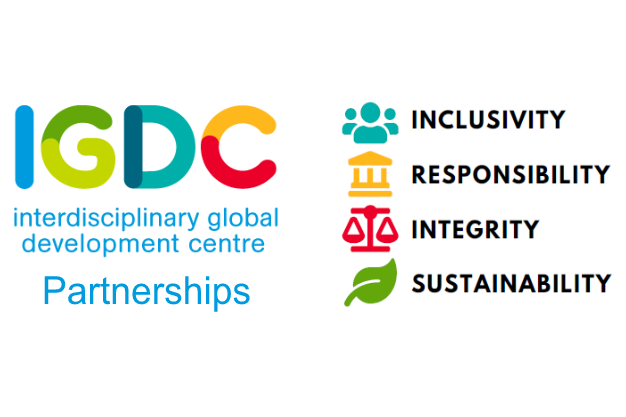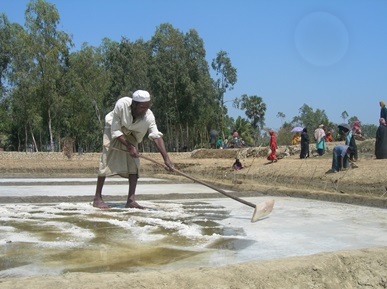Partnership Working in IGDC
As a Centre, effective partnership working is essential to help enable us to meet our core values of inclusivity, responsibility, sustainability and integrity.

One of the key focuses of the recent World Conference on Research Integrity was to establish a statement that will offer guidance on how researchers from low- and middle-income countries can become equal partners in international projects. You can read more about the challenges faced and possible solutions in this coverage in Nature on Equity in Global Collaborations.
Integrity is one of IGDC’s core values, alongside inclusivity, responsibility and sustainability. For IGDC, inclusivity means an openness to a diverse range of voices and needs. With this comes the responsibility to try to eliminate barriers to representation and participation. Our commitment to sustainability means that we look at the impact of our own actions on the livelihood of others and of future generations. Our core value of integrity challenges us to be consistent in applying the same principles which we apply to others, to ourselves. We strive to reflect this in the partnerships we form as working in collaboration with others is integral to all of these values.
Learning from our experience of working with partners and liaising with the UK Collaborative on Development Research (UKCDR) on the subject, we have put together our experiences and findings into a formal Guide to Inclusive Research (PDF ![]() , 704kb) which is now published on the new Working Papers & Briefings section of our website. The guide aims to help researchers in the ‘global North’ consider how they can best work alongside ‘global South’ partners in organising and conducting research, from the conception of ideas to the delivery of impact and outputs, in order to uphold as well as promote and champion the principles of equality, diversity and inclusion.
, 704kb) which is now published on the new Working Papers & Briefings section of our website. The guide aims to help researchers in the ‘global North’ consider how they can best work alongside ‘global South’ partners in organising and conducting research, from the conception of ideas to the delivery of impact and outputs, in order to uphold as well as promote and champion the principles of equality, diversity and inclusion.
The guide recognises the importance of inclusiveness at all stages of research:
1. Conceptualising the research project
2. Establishing the project team
3. Developing research methodology
4. Conducting field work
5. Producing outputs
6. Generating impact
Contact us
Interdisciplinary Global Development Centre
igdc@york.ac.uk
01904 323716
Department of Politics and International Relations, University of York, Heslington, York, YO10 5DD, UK
Twitter
We work hard to support a number of Networks with other organisations and the University of York to help facilitate collaborative working. One example is the Environment and population health in the Bay of Bengal (EnHealth-BoB) network. EnHealth-BoB is a network of individuals and institutions representing community-based organisations, healthcare providers, policy makers, advocacy groups, research and academia based in India and Bangladesh, along with researchers from the Stockholm Environment Institute Bangkok Thailand, the University of York and the University of Leeds UK. The Network addresses the dual challenges of development and environment primarily by focusing on the two critical impact areas of the SDG mission: (a) reducing climate risks and (b) improving health and wellbeing.

As a University we are delighted to be recognised for our Partnership Work. Earlier in the year the University entered the Times Higher Education Impact Rankings, which includes more than 1,400 institutions across the world. York was ranked seventh globally for its “partnerships for the goals”. The submission included our ‘Thanzi la Onse’ (Health of All) project which set out to design a locally led analytical model to inform decision making and policy in the allocation of healthcare resources to improve population health and reduce health inequalities in eastern and southern Africa.
SDG 17 aims to ‘Strengthen the means of implementation and revitalise the Global Partnership for Sustainable Development’, and this is reflected in our own ethos as a Centre. We feel that within IGDC, we are making important and positive steps with our partnership working, but there is always more we can do to improve. It can be challenging as researchers to recognise practices that are so ingrained in our ways of working that they can be hard to fully identify and change. Guide to Inclusive Research (PDF ![]() , 704kb) provides an easy-to-use reference to practical steps that all researchers can take to improve the inclusivity of their research, and make their own contributions to SDG17 by promoting and practising more inclusive and equitable research.
, 704kb) provides an easy-to-use reference to practical steps that all researchers can take to improve the inclusivity of their research, and make their own contributions to SDG17 by promoting and practising more inclusive and equitable research.
Contact us
Interdisciplinary Global Development Centre
igdc@york.ac.uk
01904 323716
Department of Politics and International Relations, University of York, Heslington, York, YO10 5DD, UK
Twitter